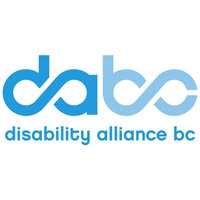Online network dialogue for Accessibility Committee members
November 14, 2025 by DABC
Do you sit on an accessibility committee at a BC public sector organization? Join our network dialogue to discuss challenges and opportunities!
Dear Accessibility Committee Members,
As the work under the Accessible BC Act continues, DABC invites you to an online network dialogue in support of public sector accessibility committee members across BC.
The accessibility committee is a key pillar of the Accessible BC Act, and your expertise and contributions are vital to this work.
Under our Accessible Organizations Project, we’ve learned through community feedback that some committees are struggling to remain engaged. We are hosting this free event to offer support and connection, particularly for members who are in smaller communities and may not have the opportunity to connect with folks in other regions.
Gathering lived experience experts from various public sector accessibility committees, we aim to probe challenges that committee members face, while prioritizing best practices and solutions.
Following a short panel discussion, a facilitated network dialogue will provide an opportunity for committee members to connect with peers from across the province, share learnings, and strengthen community partnerships.
Please join us on December 8 at 1:30 pm for this engaging event.
Link to register: https://us02web.zoom.us/webinar/register/WN_ymRpNl-CTgmfyrySYN6kZg
Panelists (subject to change)
Richard Marion, Translink
Keely Kidner, District of Squamish
Tasia Alexis, City of Vancouver
Helaine Boyd, Executive Director DABC
Roberta McDonald, Accessible Organizations Project Manager, DABC
Anna Wijesinghe, Local Government Liaison, DABC
Questions? Feel free to email Roberta McDonald, Project Manager: roberta@dabc.ca
DABC Executive Director appointed to BC's Provincial Accessibility Committee
DABC Executive Director Helaine Boyd is one of the five new members appointed to British Columbia’s Provincial Accessibility Committee (PAC). She is excited for this opportunity to advise the provincial government in the development of accessibility standards, ensuring that the voices of people with disabilities are meaningfully included.
Read the Province’s news release for more information: https://news.gov.bc.ca/releases/2025SDPR0014-001006
Let's Rally for Accessibility Celebration & Awareness
DABC is pleased to be participating in a rally/community event, led by BC People First Society:
Let’s Rally for Accessibility Celebration & Awareness
When: Saturday, November 8th, 2025, 12PM – 2PM
Where: šxʷƛ̓ənəq Xwtl’e7énḵ Square – Vancouver Art Gallery North Plaza – 800 Georgia Street
“We aim for a vibrant and peaceful accessibility rally in the heart of the city, celebrating diversity and fostering connection among disabled individuals and organizations who serve people with disabilities. With engaging guest presenters, this event aims to create a supportive community and raise awareness about the importance of accessibility in all its forms.”
Learn more: https://www.bcpeoplefirst.com/event-details/lets-rally-for-accessibility-celebration-awareness




